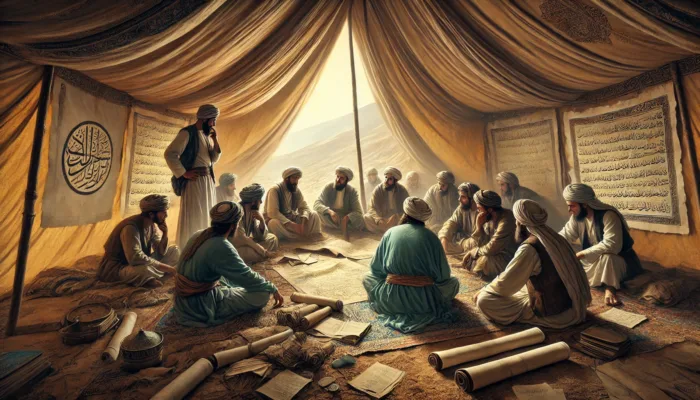Table of Contents
Introduction
In this third article of our series, ‘Era of the Rightly Guided Caliphs‘, we delve into the nation’s rights and its responsibility to oversee its ruler and its authority to remove him when necessary. Click here to read the full series.
Balancing the Nation’s Rights and Authority in Islam
Our discussion today focuses on the nation’s rights over its ruler. These rights can be broadly categorized into three key aspects: the right of appointment, the right of monitoring, and the right of removal. The nation holds the authority to appoint its ruler, oversee and guide his actions, offer advice, and, when necessary, remove him from power. In our previous article, we explored the right of appointment, and in this article, we will examine the nation’s rights to monitor its ruler and, if needed, to remove him.
During a conversation on this topic, a friend highlighted that similar rights—appointment, monitoring, and removal—exist within Western systems and secular states. This observation brings to light a crucial distinction that must be understood: the fundamental difference between the Islamic framework and the secular system in shaping political governance.
Islam establishes a society where power is balanced between the nation and its authority, ensuring that the nation remains strong in holding rulers accountable. Prophetic teachings in the Islamic context emphasize listening to and obeying rulers. Why is this? Because the nation’s rights include the ability to rise against oppressive rulers, making it inherently powerful. These texts aim to guide this strength, urging obedience except in cases where clear disbelief is evident, supported by undeniable proof from ALLAH, or when the nation is capable of implementing reform effectively.
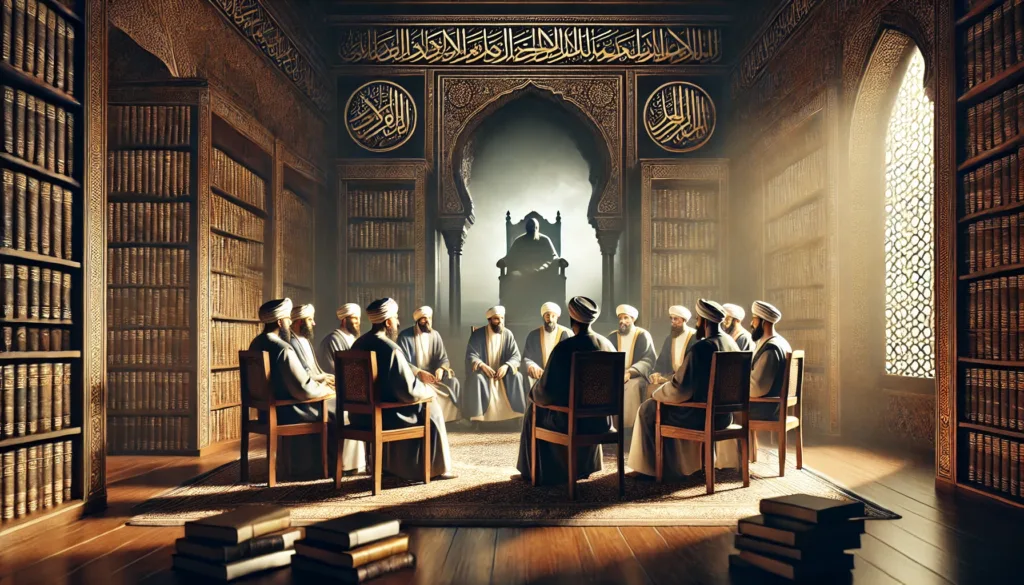
This guidance speaks to a nation that holds significant strength in the face of authority. In contrast, the modern secular system, as seen in centralized states, operates on a different principle—concentrating power within the authority and stripping it away from society. Many Western thinkers and theorists have warned about the dangers of such a system, referring to it as the ‘god-state’ or the ‘Leviathan’. In this framework, the authority monopolizes all the nation’s rights and power, leaving society weakened, like a defenseless individual before a heavily armed opponent, or a prisoner at the mercy of their jailer.
This highlights the importance of clearly understanding the distinction between the Islamic system, which is founded on a balance of power between the Ummah (the nation) and the authority—empowering the nation to hold rulers accountable—and the Western system, where authority consolidates and monopolizes all aspects of power.
The Nation’s Role in Monitoring and Correcting the Ruler According to Shariah
Abu Bakr (may ALLAH pleased with him) laid the foundation of the Islamic political system in his inaugural speech, saying:
“If I do well, support me; and if I err, correct me. Obey me as long as I obey ALLAH regarding you, and if I disobey HIM, you owe me no obedience“
These profound words reflect a principle rarely seen among rulers. Abu Bakr (may ALLAH pleased with him) was not seeking personal power or glory; rather, he was establishing a system rooted in religion and accountability. From the outset, he ensured that the nation understood its rights over the ruler and its responsibility toward him. His statement, “If I do well, support me, and if I err, correct me“, made it clear that the nation is both a monitor and a partner to the ruler. It is responsible for supporting the ruler in righteousness and advising or correcting him when he strays. This partnership is governed by Shariah, which holds authority over both the ruler and the ruled in Islam.
The Islamic nation is entrusted with a higher purpose; it is not a nation consumed by materialism or focused solely on luxury, pleasure, and prosperity. Instead, it carries the responsibility of upholding the message of Islam. The nation’s right to monitor its ruler stems from this responsibility, ensuring that he fulfills his duties as outlined by the divine message. This means that a ruler cannot propose actions or policies that contradict Islamic values, even if they appear beneficial from a purely material perspective.
For example, a ruler cannot justify the establishment of immoral institutions, such as houses of adultery, under the pretext of generating taxes or boosting the national economy. Similarly, laws that favor businessmen by enabling fraud or monopolies to attract investments cannot be tolerated, as they conflict with the ethical and moral framework of Islam.
The nation’s rights include upholding the standard of Shariah in its monitoring of the ruler. Both the ruler and the nation are bound to this standard, which serves as the ultimate measure for governance, ensuring that neither luxury nor material benefit takes precedence over Islamic principles.
The Nation’s Rights in Ensuring the Ruler’s Legitimacy through Shariah Compliance
Here, we must carefully distinguish between two profound statements made by Abu Bakr (may ALLAH pleased with him). The first: “If I do well, support me, and if I err, correct me“, and the second: “Obey me as long as I obey ALLAH and HIS Messenger, and if I disobey Him, you owe me no obedience“.
In the first statement, Abu Bakr addresses matters that fall within the framework of Shariah—matters of interpretation and implementation. These are detailed issues where differences in judgment may arise. As long as these actions remain aligned with the overarching principles of Shariah, they are subject to constructive advice and support: support when the ruler does well and correction when he errs.
However, the second statement highlights a fundamental issue—the ruler’s adherence to Shariah as the ultimate authority. “Obey me as long as I obey ALLAH and HIS Messenger“ establishes that legitimacy is tied to obedience to divine law. When Abu Bakr says, “If I disobey HIM, you owe me no obedience“, he is drawing a firm line. The ruler’s deviation from Shariah nullifies his legitimacy; it is no longer a matter of advice or correction but a complete withdrawal of obedience.
Imam Abdul-Qahir Al-Baghdadi (may ALLAH have mercy on him) explained this principle with clarity:
“When the ruler outwardly maintains compliance with Shariah, his leadership remains properly ordered. When he deviates, the nation becomes a standard against him—either to correct his error or to turn away from him to another”
In essence, the nation’s rights grant it the authority to act as a check against the ruler. If he errs, they guide him back to the truth; if he strays from Shariah entirely, they have the right to remove him and appoint someone else.
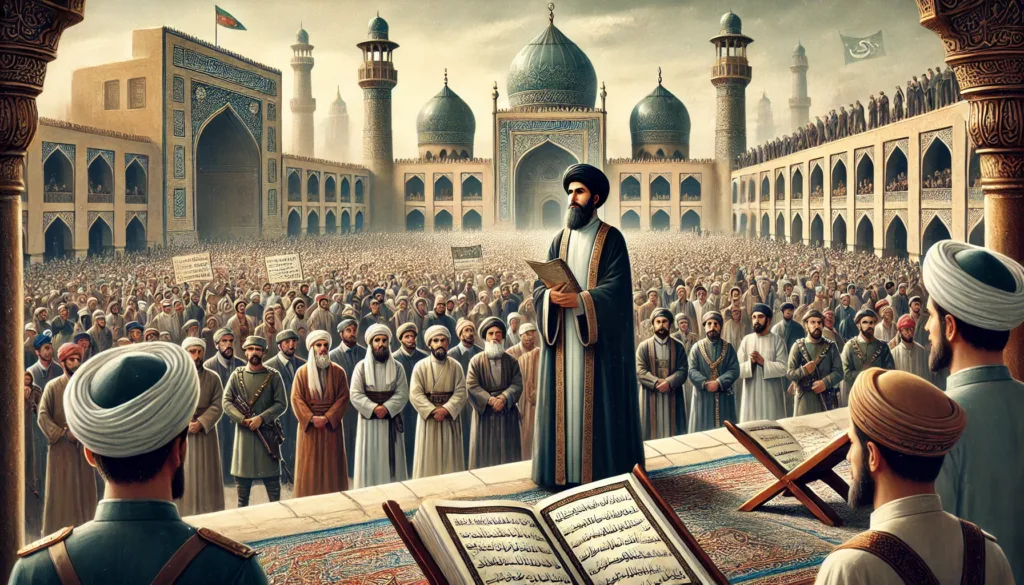
This relationship mirrors the ruler’s own dealings with his deputies, judges, and governors. If they deviate from the path of justice, he either corrects them or replaces them. Similarly, if the ruler himself departs from Shariah, he forfeits his legitimacy. The nation then transitions from exercising its right of monitoring to implementing its right of removal, upholding Shariah as the ultimate standard. Thus, adherence to Shariah is the cornerstone of the ruler’s legitimacy, and deviation from it is the basis for the nation’s decisive action.
The Boundaries of Authority and Accountability in the Era of the Rightly Guided Caliphs
Abu Bakr (may ALLAH pleased with him) set a precedent that the Rightly Guided Caliphs who succeeded him upheld. Their inaugural speeches consistently revolved around central themes: establishing ALLAH’s commands, governing based on the Book of ALLAH and the Sunnah of HIS Messenger (Peace be upon Him), and ensuring the religion was upheld. Even during periods of opposition—such as during the caliphates of Uthman and Ali (may ALLAH be pleased with them)—the disputes were framed within the boundaries of Shariah.
For instance, those who revolted against Uthman claimed he had deviated from Shariah, alleging that he had strayed from the practices of the two caliphs before him and from the principles of the Quran and Sunnah. While their true intentions may have been driven by personal motives, they still cloaked their rebellion in claims of adherence to Shariah. Similarly, the opposition faced by Ali (may ALLAH be pleased with him) was centered around implementing divine justice, specifically the punishment of retaliation against the killers of Uthman. Thus, even in the face of discord, the nation’s rights and actions remained aligned with the framework of Shariah.
An illustrative moment from Abu Bakr’s caliphate highlights this principle. Once, a man spoke harshly to Abu Bakr, visibly angering him. Seeing this, Abu Barza Al-Aslami (may ALLAH be pleased with him) said, “Shall I strike his neck, O Caliph of the Messenger of ALLAH?“ Abu Bakr dismissed the matter, shifting the focus. After the gathering ended, he called Abu Barza and asked, “Would you truly have done it if I had told you to strike his neck?“ Abu Barza replied, “Yes, by ALLAH, if you order me now, I would do it“. Abu Bakr responded,
“By ALLAH, this is not for anyone after Muhammad (Peace be upon Him)“
This interaction underscores a critical distinction: such actions were only justified during the time of the Prophet (Peace be upon Him), who received divine revelation and whose authority was absolute. The caliphs who followed, however, were human and subject to the nation’s monitoring and accountability. It was not permissible to suggest striking down someone simply for opposing the caliph, for their authority, while significant, was always subject to Shariah and the nation’s rights to counsel and correction.
The Role of Consultation (Shura) in Governance and the Nation’s Duty to Monitor the Ruler
The right of monitoring, in which the nation actively participates with the ruler, aligns with the concept of Shura (consultation) from the ruler’s perspective. However, it is important to distinguish between a right and a duty. A right is optional—it can be exercised or neglected—while a duty is obligatory, and neglecting it is sinful. Advising the caliph and correcting him when needed is not merely a right for the nation but a duty that must be fulfilled.
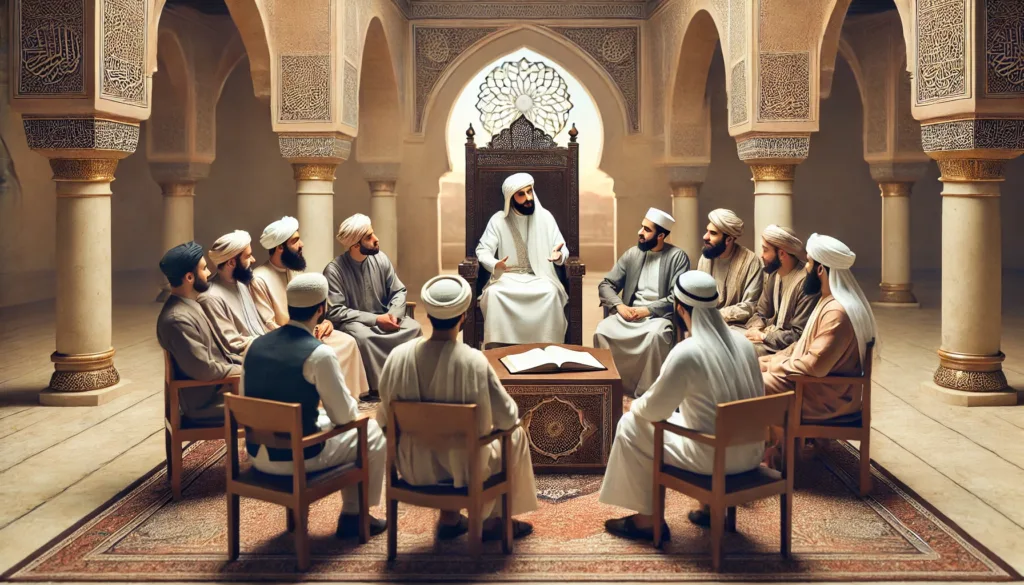
From the ruler’s perspective, scholars classify consultation into two types: consultation in appointment, related to the right of appointing a ruler, and consultation in governance, where the leader seeks the nation’s input on matters of administration. Even the Prophet Muhammad (Peace be upon Him) who was the most complete, wise, and knowledgeable of people, regularly consulted His companions. Abu Hurairah (may ALLAH be pleased with him) said,
“I have never seen anyone who consulted His companions more than the Messenger of ALLAH (Peace be upon Him)“
Consultation was a defining feature of the Islamic state, even before its establishment. In the Meccan period, ALLAH gave glad tidings to the believers in Surah Al-Shura:
“And those who have responded to their LORD and established prayer and whose affair is [determined by] consultation among themselves, and from what WE have provided them, they spend“1
(Suraat ‘Ash-Shuuraa, 42:38)
This verse highlighted the foundational role of consultation in their future governance, contrasting sharply with the tribal despotism of the pre-Islamic era.
The Prophet (Peace be upon Him) exemplified the practice of consultation. For instance, during the Battle of Uhud, He accepted the advice of those who advocated leaving Medinah to confront the enemy outside the city. Although the events at Uhud unfolded as they did, ALLAH reaffirmed the importance of consultation in governance through HIS words:
“So by mercy from ALLAH, [O Muḥammad], You were lenient with them. And if You had been rude [in speech] and harsh in heart, they would have disbanded from about You. So pardon them and ask forgiveness for them and consult them in the matter...“1
(Suraat ‘Ali-‘Imraan, 3:159)
This divine confirmation of consultation came even after a decision that, at first glance, seemed to lead to defeat.
Consultation as a Pillar of Leadership in the Era of the Rightly Guided Caliphs
The Rightly Guided Caliphs upheld the Sunnah of the Prophet (Peace be upon Him) by placing consultation (Shura) at the core of their leadership. Abu Bakr (may ALLAH be pleased with him) when faced with a matter, would first ask the companions—especially the senior companions and scholars—if they had any hadith from the Messenger of ALLAH (Peace be upon Him) regarding the issue. If no such hadith existed, he would consult as many people as possible. Only when broader consultation was not feasible would he rely on his own interpretation.
Similarly, Umar (may ALLAH be pleased with him) made extensive use of consultation. He frequently sought the counsel of scholars among the companions, including figures like Uthman, Ali, Abdur-Rahman ibn Awf, Ubay bin Ka’b, and Zayd bin Thabit. These scholars, along with others, formed a consultative body that advised the caliphs on significant matters.
However, Umar’s consultation was not limited to this group; he also consulted the Emigrants (Muhajirun), the Helpers (Ansar), and even elders of Quraysh who had accepted Islam later. A notable example of this is the plague of Amwas, during which he sought advice from many before ultimately hearing the well-known hadith from Abdur-Rahman ibn Awf:
“If you hear of a plague in a land, do not enter it; and if it occurs in a land while you are in it, then do not leave it“3
Imam Al-Zuhri (may ALLAH have mercy on him) emphasized how Umar valued the opinions of youth. He would say, “Do not belittle yourselves, for Umar would gather young men for difficult matters”, recognizing their sharp intellect and fresh perspectives.
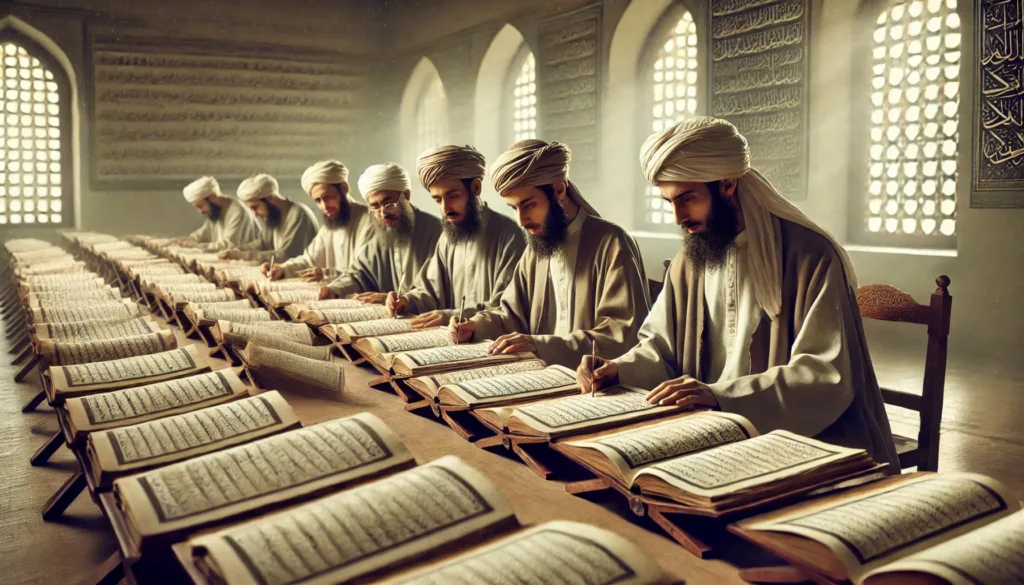
This practice of consultation continued with the other Rightly Guided Caliphs. For instance, Uthman (may ALLAH be pleased with him) consulted widely on the compilation and standardization of the Quran manuscripts. His decision to unify the community on a single manuscript was carried out with the full knowledge and agreement of other companions. Ali (may ALLAH be pleased with him) defended Uthman’s actions, saying:
“O people, do not exaggerate regarding Uthman, for what he did concerning the manuscripts was done with our full knowledge, and if I were in his position, I would have done what he did“
The first significant issue faced by Uthman (may ALLAH be pleased with him) during his caliphate involved the case of Ubaydullah bin Umar and the killing of Al-Hurmuzaan. Ubaydullah, the son of Umar bin Al-Khattab (may ALLAH be pleased with him) acted impulsively after suspicions arose linking Al-Hurmuzaan to the assassination of his father alongside Abu Lu’lu’ah the Magian. Overcome by grief and unable to restrain himself, Ubaydullah killed Al-Hurmuzaan without the matter being proven through a proper judicial process or trial.
Upon assuming the caliphate, Uthman consulted the people on this delicate matter. The question was whether to seek retribution from Ubaydullah for the killing of Al-Hurmuzaan or to resolve the issue through the payment of blood money.
The Role of Consultation and the Nation’s Right of Removal in the Era of the Rightly Guided Caliphs
The Rightly Guided Caliphs placed immense importance on consultation (Shura), making it a cornerstone of their governance. They consistently sought the opinions of the companions and did not manage affairs without collective input. One of the most well-known examples of consultation by Ali (may ALLAH be pleased with him) occurred during the events of Siffin. In that situation, he accepted the companions’ advice to halt fighting and proceed with arbitration. This demonstrates how deeply consultation was embedded in their leadership, becoming a consensus that served as a binding example for the Muslim rulers and caliphs who followed.
In addition to emphasizing consultation, the Muslims during that time exercised their right of removal. A notable example is from the caliphate of Umar (may ALLAH be pleased with him) when the people of Kufa repeatedly expressed dissatisfaction with their governors, even when these governors were senior companions. Umar, recognizing the importance of addressing the grievances of the people, would replace the governors they disliked. Among those removed from Kufa were respected figures such as Sa’d bin Abi Waqqas, Abu Musa Al-Ash’ari, and Al-Mughirah bin Shu’bah (may ALLAH be pleased with them all).
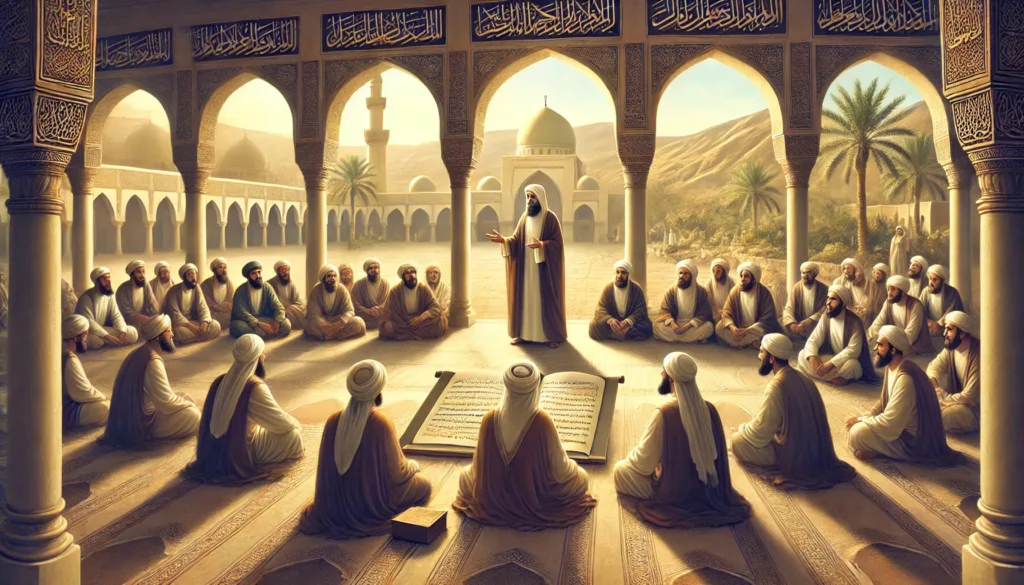
Interestingly, Al-Mughirah bin Shu’bah, known for his political acumen, and Sa’d bin Abi Waqqas, whom Umar later nominated for the caliphate, were removed not because of any fault or betrayal but simply because the people were not satisfied with them. Umar made this clear, saying: “Know, O people, that I did not remove him due to displeasure or treachery, but the people were not satisfied with him”. He famously stated: “It is a small matter for me to replace a governor to improve the condition of a people”, emphasizing that his priority was the welfare and satisfaction of the nation.
This approach continued during the caliphate of Uthman (may ALLAH be pleased with him). When the people of Kufa requested the removal of Sa’eed bin Al-‘As, Uthman complied, appointing Abu Musa Al-Ash’ari in his place. In his letter to the people of Kufa, Uthman wrote:
“O people of Kufa, I have removed from you whom you dislike and appointed over you whom you love. By ALLAH, I will lay out my honor for you, and I will exert my effort for you. You will not leave anything you love that does not involve disobedience to ALLAH except that you will be given it, and you will not leave anything you dislike that does not involve disobedience to ALLAH except that you will be relieved from it. And I will answer you to that until you reach your argument, and you will have no argument against me”
The Caliphs’ Acceptance of Accountability and the Nation’s Right of Removal
The Muslims actively exercised their right of removal, and the caliphs respected this right without resistance. Abu Bakr (may ALLAH be pleased with him) acknowledged this principle from the beginning, saying, “I have been appointed over you though I am not the best of you”. By establishing that removal was the nation’s right, he set a precedent that none of the Rightly Guided Caliphs rejected. While the nation never chose to remove any of the Rightly Guided Caliphs—due to their exceptional leadership—the principle of accountability remained foundational.
Even during the caliphate of Uthman bin Affan (may ALLAH be pleased with him) he did not see his position as untouchable. He engaged with those who opposed him, addressing their concerns and negotiating with them. Uthman clarified that much of what they criticized was either unfounded or based on misunderstandings, and he emphasized that his actions were grounded in reasoned interpretation, which did not warrant his removal. None of the caliphs ruled with an air of absolute power or claimed sanctity that placed them beyond accountability. They understood their positions as a responsibility, not as a right above the nation.
When rebellion against Uthman intensified, he sought advice from Abdullah bin Umar, who responded: “Do not remove a garment that Allah has clothed you with lest it become a precedent—every time people dislike their leader, they remove him”. This advice highlighted a critical concern: if every caliph were to step down due to dissatisfaction from a vocal minority, it would undermine the stability of governance. As long as the majority of the nation supported a caliph, the demands of a minority should not dictate his removal.
The Three Historical Phases of Islamic Governance: From Ideal Rule to Modern Challenges
Dear brothers, our Islamic history can be understood as passing through three distinct phases:
The First Phase
This was the era of the Rightly Guided Caliphate, during which the nation’s three fundamental rights—appointment, monitoring, and removal—were fully realized.
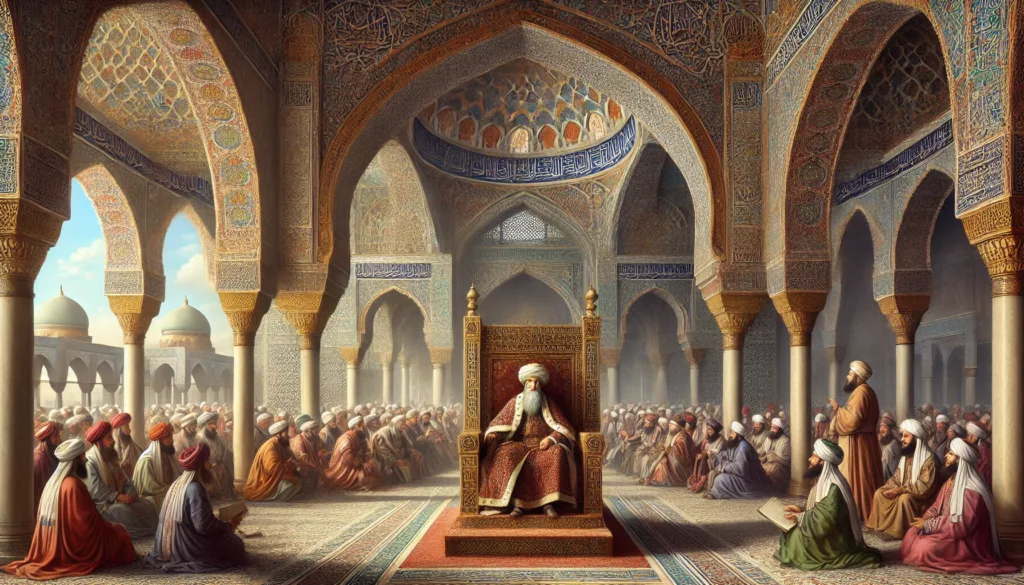
The Second Phase
Known as the era of biting kingship (al-Mulk al-‘Adood), this phase marked a decline from the ideal governance of the Rightly Guided Caliphs. During this period, rulers were not chosen by the nation, and their authority often stemmed from hereditary or imposed power. Nonetheless, these kings, despite their deviations, injustices, or personal faults, generally belonged to the core of the Muslim nation. They defended the nation, advanced its cause, and fought for its survival and empowerment. This phase, which extended from the Umayyad period through the Ottoman Empire, was not free from revolutions and uprisings, many of which were led or supported by scholars and jurists.
The Third Phase
This is the era of coercive rule, beginning with modern colonialism and occupation. Colonial powers left behind local agents to rule in their place, and these rulers often governed in ways worse than the colonizers themselves. Their conduct brought harm to the nation, sometimes surpassing even the oppressive policies of colonial powers. When people revolted against these rulers, the occupying forces would intervene—either through direct military suppression, by replacing one agent with another, or by crushing uprisings with destructive force.
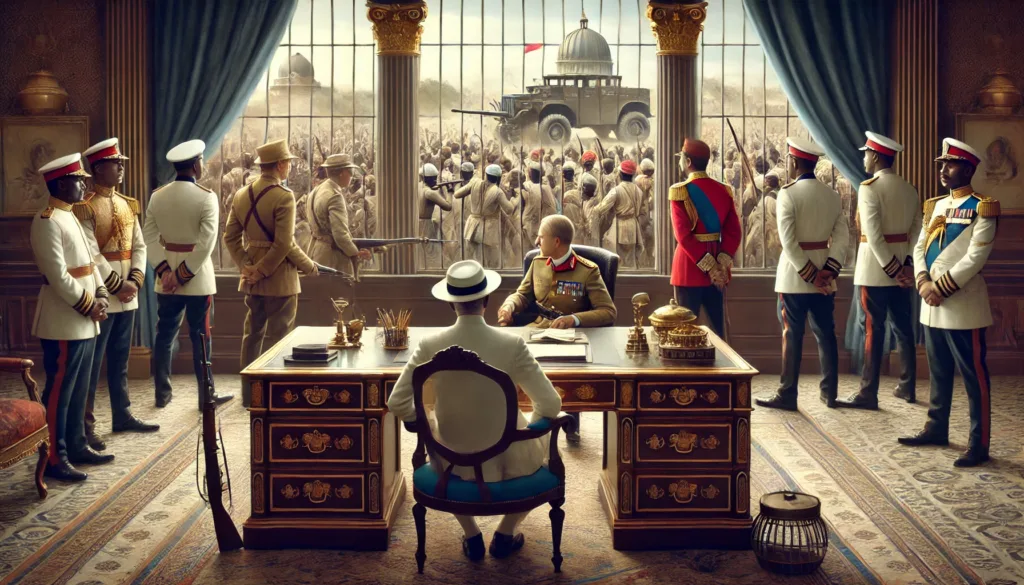
The preservation of the nation’s rights—its right to appoint, monitor, and remove its leaders—and its unwavering belief in and adherence to these rights are what safeguard it from becoming a tool in the hands of oppressors and occupiers.
I ask ALLAH, the Blessed and Exalted, to teach us what benefits us, to allow us to benefit from what HE has taught us, and to increase us in beneficial knowledge.
Sources:
- Mohamed Elhamy. محمد إلهامي | عصر الخلافة الراشدة | 3. حقوق الأمة على الحاكم. YouTube Video.

